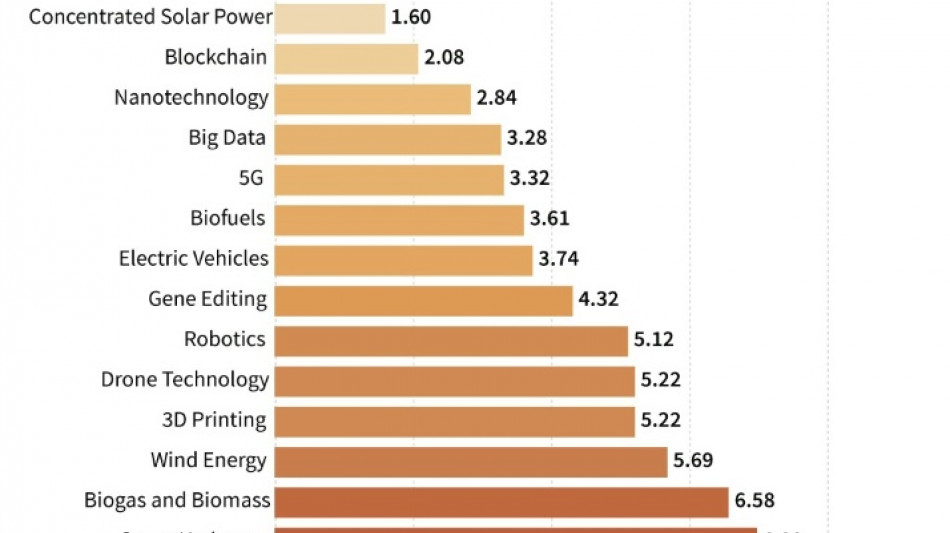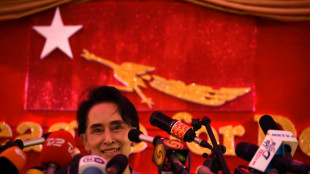
-
 Myanmar pro-military party claims Suu Kyi's seat in junta-run poll
Myanmar pro-military party claims Suu Kyi's seat in junta-run poll
-
Fed chair Powell says targeted by federal probe

-
 Trailblazing Milos Raonic retires from tennis
Trailblazing Milos Raonic retires from tennis
-
Australia recalls parliament early to pass hate speech, gun laws

-
 'One Battle After Another,' 'Hamnet' triumph at Golden Globes
'One Battle After Another,' 'Hamnet' triumph at Golden Globes
-
Japan aims to dig deep-sea rare earths to reduce China dependence

-
 Top UN court to hear Rohingya genocide case against Myanmar
Top UN court to hear Rohingya genocide case against Myanmar
-
US sends more agents to Minneapolis despite furor over woman's killing

-
 Trump says Iran 'want to negotiate' after reports of hundreds killed in protests
Trump says Iran 'want to negotiate' after reports of hundreds killed in protests
-
Bangladesh's powerful Islamists prepare for elections

-
 NBA-best Thunder beat the Heat as T-Wolves edge Spurs
NBA-best Thunder beat the Heat as T-Wolves edge Spurs
-
Ukraine's Kostyuk defends 'conscious choice' to speak out about war

-
 Trump says working well with Venezuela's new leaders, open to meeting
Trump says working well with Venezuela's new leaders, open to meeting
-
Asian equities edge up, dollar slides as US Fed Reserve subpoenaed

-
 Hong Kong court hears sentencing arguments for Jimmy Lai
Hong Kong court hears sentencing arguments for Jimmy Lai
-
Powell says Federal Reserve subpoenaed by US Justice Department

-
 Chalamet, 'One Battle' among winners at Golden Globes
Chalamet, 'One Battle' among winners at Golden Globes
-
Turning point? Canada's tumultuous relationship with China

-
 Eagles stunned by depleted 49ers, Allen leads Bills fightback
Eagles stunned by depleted 49ers, Allen leads Bills fightback
-
Globes red carpet: chic black, naked dresses and a bit of politics

-
 Maduro's fall raises Venezuelans' hopes for economic bounty
Maduro's fall raises Venezuelans' hopes for economic bounty
-
Golden Globes kick off with 'One Battle' among favorites

-
 Australian Open 'underdog' Medvedev says he will be hard to beat
Australian Open 'underdog' Medvedev says he will be hard to beat
-
In-form Bencic back in top 10 for first time since having baby

-
 Swiatek insists 'everything is fine' after back-to-back defeats
Swiatek insists 'everything is fine' after back-to-back defeats
-
Wildfires spread to 15,000 hectares in Argentine Patagonia

-
 Napoli stay in touch with leaders Inter thanks to talisman McTominay
Napoli stay in touch with leaders Inter thanks to talisman McTominay
-
Meta urges Australia to change teen social media ban

-
 Venezuelans await political prisoners' release after government vow
Venezuelans await political prisoners' release after government vow
-
Lens continue winning streak, Endrick opens Lyon account in French Cup

-
 McTominay double gives Napoli precious point at Serie A leaders Inter
McTominay double gives Napoli precious point at Serie A leaders Inter
-
Trump admin sends more agents to Minneapolis despite furor over woman's killing

-
 Allen magic leads Bills past Jaguars in playoff thriller
Allen magic leads Bills past Jaguars in playoff thriller
-
Barca edge Real Madrid in thrilling Spanish Super Cup final

-
 Malinin spearheads US Olympic figure skating challenge
Malinin spearheads US Olympic figure skating challenge
-
Malinin spearheads US figure Olympic figure skating challenge

-
 Iran rights group warns of 'mass killing', govt calls counter-protests
Iran rights group warns of 'mass killing', govt calls counter-protests
-
'Fragile' Man Utd hit new low with FA Cup exit

-
 Iran rights group warns of 'mass killing' of protesters
Iran rights group warns of 'mass killing' of protesters
-
Demonstrators in London, Paris, Istanbul back Iran protests

-
 Olise sparkles as Bayern fire eight past Wolfsburg
Olise sparkles as Bayern fire eight past Wolfsburg
-
Man Utd knocked out of FA Cup by Brighton, Martinelli hits hat-trick for Arsenal

-
 Troubled Man Utd crash out of FA Cup against Brighton
Troubled Man Utd crash out of FA Cup against Brighton
-
Danish PM says Greenland showdown at 'decisive moment' after new Trump threats

-
 AC Milan snatch late draw at Fiorentina as title rivals Inter face Napoli
AC Milan snatch late draw at Fiorentina as title rivals Inter face Napoli
-
Venezuelans demand political prisoners' release, Maduro 'doing well'

-
 'Avatar: Fire and Ashe' leads in N.America for fourth week
'Avatar: Fire and Ashe' leads in N.America for fourth week
-
Bordeaux-Begles rout Northampton in Champions Cup final rematch

-
 NHL players will compete at Olympics, says international ice hockey chief
NHL players will compete at Olympics, says international ice hockey chief
-
Kohli surpasses Sangakkara as second-highest scorer in international cricket


Green tech boom looms but poor nations risk being eclipsed: UN
The green technology industry could be worth several trillion dollars by 2030 but developing countries will miss out on the boom unless they jump in now, the UN said Thursday.
From a roughly equal position three years ago, green technology exports from the most advanced countries are already racing ahead of developing nations, warned the United Nations' trade and development agency, UNCTAD.
And without intervention to close the gap, early adopters will build in lasting advantages, making it even harder for developing countries to catch up, UNCTAD said.
"We are at the beginning of a technological revolution based on green technologies," said the agency's chief Rebeca Grynspan.
"Missing this technological wave... would have long-lasting negative implications."
UNCTAD estimated that 17 key frontier technologies, which are at the leading edge of green innovation, could create a market worth more than $9.5 trillion by 2030 -- up from $1.5 trillion in 2020.
The technologies include artificial intelligence, electric vehicles, green hydrogen, biofuels, nanotechnology, 5G, gene editing, robotics, 3D printing, wind energy and blockchain.
They can be used to produce goods and services in a way that leaves a smaller carbon footprint.
The United States and China currently dominate these fields, with a combined 70 percent of patents.
- Richest gaining ground -
As for readiness to adopt and exploit such technologies, UNCTAD's ranking chart is dominated by high-income countries, led by the United States, Sweden, Singapore, Switzerland and the Netherlands.
Of the BRICS nations, Russia is ranked 31st, China 35th, Brazil 40th, India 46th and South Africa 56th -- the highest on the African continent.
China's lower-than-expected position is due to patchy rural internet coverage and slow broadband speed.
However, several Asian countries are over-performing, with India 67 places higher than its GDP per capita ranking, the Philippines 54 spots higher and Vietnam 44 places higher, leaving them well-placed to seize the initiative.
Latin America, the Caribbean and sub-Saharan Africa are at highest risk of missing current windows of opportunity.
Despite a level start, a gap is already opening up in green tech exports, with developed countries pulling away from the rest with exponential growth.
Total green tech exports from developed countries jumped from around $60 billion in 2018 to more than $156 billion in 2021, while over the same period, exports from developing nations -- China included -- rose from $57 billion to around $75 billion.
In those three years, developing countries' share of global exports fell from over 48 percent to below 33 percent.
- Trade, climate, IP rules tangled -
UNCTAD noted that smaller developing countries, which have done little to cause climate change, were often set to feel the brunt -- yet were left struggling to access the technology that could help them mitigate against it.
The agency's deputy leader Pedro Manuel Moreno said they were caught between promoting economic growth and protecting the environment.
"They need more investment, more tech transfer and more international coherence between global climate and trade agreements," Moreno told reporters.
He said trade rules should be changed to help developing countries protect nascent green industries through tariffs, subsidies and public procurement.
The trading system has to be streamlined with the landmark Paris Agreement on climate change, he said, so that green tech can be transferred effectively to developing nations.
Shamika Sirimanne, UNCTAD's technology and logistics director, said a "less stringent intellectual property regime at the global level is needed urgently" to help such countries benefit.
She called for a patents waiver to promote the transfer of climate change-related technology.
R.AbuNasser--SF-PST



